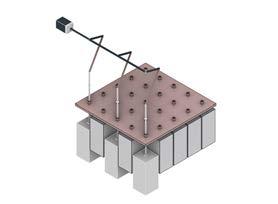
1 minute read
Computational toolkit for early-stage cost assessment and optimisation of BIPV façades
from BT Bundle 2020
by RuMoer
Half of the global population lives in urban areas and consume 75 per cent of the world’s resources, and these numbers are continually increasing. This necessitates the reduction of energy consumption and raising its generation. Urban environments face new challenges about the integration of photovoltaic (PV) systems onto the building envelope sustainably. Many buildings in the Netherlands are being refurbished, and their insulation properties are improved. A concept to employ building integrated photovoltaic panels (BIPV) is to replace the façade cladding with BIPV panels whenever possible.
An aspect to take into consideration when designing a costeffective BIPV system is the orientation and tilt of the panels as the energy yield would be maximum when the sun is directly perpendicular to them. The optimum orientation of the PV panel for the Netherlands is south with an angle of 37°, which maximises total electricity production. While the process is Project vision quite straightforward for new buildings and systems deployed in areas with no orientation restrictions or horizon obstructions, the scenario becomes more challenging in urban settlements.
Advertisement
As the buildings cannot be reoriented in an urban context, a solution may be tilting the cladding panels attached to the façade. However, this would increase the initial investment costs as more material and labour would be needed. So, employing this strategy in the right place with right angles would assist in reaching a cost-effective solution. The balance between energy yield and added production costs can be found by locating the right panel in the right place on a limited budget.
In this study, an early-stage computational design method to optimally allocate and reorient BIPV façade modules to reach a cost-effective and applicable solution is presented. The tool
was tested in the AMC Amasterdam building.
Name Graduation year Tutors
Standard panel allocation

Computational design flowchart











